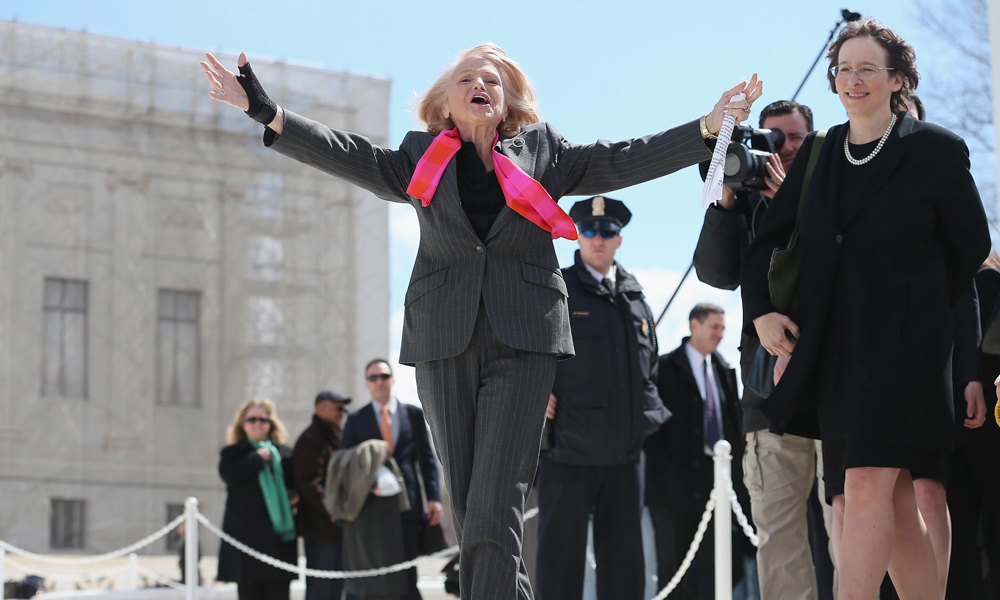New York woman successfully challenged a federal law that defined marriage…
By Christopher Turner
The LGBT community lost a true hero in September, when Edith Windsor passed away in a Manhattan hospital at the age of 88. The gay-rights activist’s landmark case led the American Supreme Court to dismantle 1996’s controversial Defense of Marriage Act (DOMA), helping to ensure that same-sex couples across the United States had the right to marry, as well as the rights to a host of federal benefits that until then only married heterosexuals had enjoyed. Four decades after the Stonewall Inn uprising fuelled the fight for LGBT rights around the globe, and years after Canada became the fourth country in the world to legalize gay marriage, Windsor became the lead plaintiff in one of the most important Supreme Court rulings in history.
Ironically, Windsor never intended to become the face in the national battle over same-sex marriage rights. She had originally gone to court simply to obtain a tax refund when she was faced with a large tax bill after the death of her first spouse, Thea Spyer. The women, Americans who had spent more than 40 years together, had gone to Toronto so they could get married legally on May 22, 2007, and when Spyer died in 2009, she left her estate to Windsor. If Windsor had been the widow in a heterosexual couple, she would have been exempted from paying federal taxes on that estate. But because DOMA meant her marriage was not recognized as legal in the United States, she was not exempted, and as a result faced a $363,053 tax bill. Outraged, she went to court, where her lawyers argued the DOMA violated equal protection.
“It’s a very important case. It’s bigger than marriage, and I think marriage is major. I think if we win, the effect will be the beginning of the end of stigma,” she said in 2012 after the Supreme Court agreed to hear the case.
When her case made it to the Supreme Court in 2013, DOMA was declared unconstitutional, and then-President Barack Obama called Windsor with his congratulations. The precedent set by that ruling was instrumental in the overall legalization of gay marriage two years later.
Windsor, who was a grand marshal of New York City’s LGBT Pride March and a runner-up to Pope Francis for Time magazine’s Person of the Year in 2013, became a gay-rights matriarch, and a hero to those who felt they didn’t have a voice.
Windsor was born Edith Schlain in Philadelphia on June 20, 1929. Edie, as she was known, married her brother’s friend Saul Wiener after receiving her bachelor’s degree from Temple University in 1950. Less than a year later, they were divorced. The couple had both used the surname Windsor, and she kept her married name with she moved to New York shortly after the divorce. In 1957, Windsor earned a master’s degree in applied mathematics from New York University and learned computer programming before she was hired by IBM as a computer programmer in 1958.
Windsor met Dr. Thea Spyer, a clinical psychologist, in 1963 at a Greenwich Village restaurant, Portofino, but they didn’t begin dating until 1965, after meeting again in the Hamptons. Spyer proposed in 1967, and they were engaged for 40 long years until their eventual marriage, some 30 years after Spyer was diagnosed with multiple sclerosis.
“If you have to outlive a great love, I can’t think of a better way to do it than being everybody’s hero,” Windsor said in 2013. The film Edie & Thea: A Very Long Engagement, about their relationship, was released in 2009.
Throughout her later years, Windsor’s advocacy and sacrifices continued. In her work with various organizations—including the LGBT Community Center, Lesbians Who Tech, and Services & Advocacy for GLBT Elders—she was generous with her time, energy, expertise and financial support.
On September 26, 2016, Windsor married Judith Kasen in an understated ceremony at City Hall in New York City. They had met at an event in 2005 and, for Windsor, the marriage was a fortuitous story about finding love in widowhood. At the time of the wedding, Windsor was aged 87 and Kasen was 51.
“I was empty and then this woman walked into my life,” she told the Times then. “I didn’t think it would happen again and it did. She is it.”
“I lost my beloved spouse Edie, and the world lost a tiny but tough as nails fighter for freedom, justice and equality,” Kasen-Windsor said in a statement. “Edie was the light of my life. She will always be the light for the LGBTQ community which she loved so much and which loved her right back.”
After her death, former President Obama called Windsor one of the “quiet heroes” whose persistence had furthered the cause of equality. “Few were as small in stature as Edie Windsor—and few made as big a difference to America,” Obama said in a statement, adding that he had spoken to her a few days earlier.
Anthony Romero, executive director of the American Civil Liberties Union, called Windsor “one of this country’s great civil rights pioneers.”
“The wheels of progress turn forward because of people like Edie, who are willing to stand up in the face of injustice,” Romero said in a statement. “One simply cannot write the history of the gay rights movement without reserving immense credit and gratitude for Edie Windsor.”
Former President Bill Clinton, who had signed DOMA into law, also commented on Windsor’s death.
“In standing up for herself, Edie also stood up for millions of Americans and their rights. May she rest in peace.”
Windsor’s attorney, Roberta Kaplan, said in a statement that representing Windsor “was and will always be the greatest honour of my life. She will go down in the history books as a true American hero.”
Few had bigger shoulders than Edie Windsor. She was a trailblazer at the forefront of LGBTQ equality who changed the lives of countless Americans for decades to come and inspired activists around the globe.
There is no dispute that she left the world a better place than when she found it. This is her legacy.
Rest in Power.
CHRISTOPHER TURNER acted as guest editor for this issue of IN magazine. He is a Toronto-based writer, editor and lifelong fashionisto with a passion for pop culture and sneakers. Follow him on social media at @Turnstylin.






Comments
1 Comment